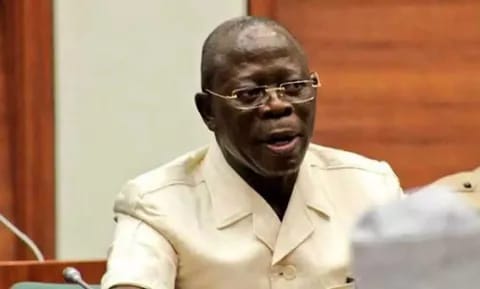In a bold statement that has stirred political waters in Edo State, Senator Adams Oshiomhole, representing Edo North, has expressed his full support for the recent suspension of all 18 local government chairmen and their deputies by the Edo State House of Assembly.
This suspension, which comes as a result of alleged insubordination and gross misconduct, has generated significant controversy, as it signals a deepening rift between the local councils and the state government led by Governor Monday Okpebholo.
Speaking at his residence in Iyamho, Etsako West Local Government Area, Diaspora digital media (DDM) gathered that Oshiomhole, a former governor of Edo State, made it clear that he stands behind the actions of the Edo State House of Assembly.
He called the decision a necessary step toward restoring order and transparency in the governance of the state’s local councils.
He went further to suggest that the local government chairmen had been involved in questionable financial dealings with the immediate past governor of Edo State, Godwin Obaseki.
He stated that these financial practices were detrimental to the people of the state.
The former governor turned senator emphasized that under the leadership of Governor Okpebholo, the state was witnessing a shift in how things were being run.
According to Oshiomhole, the Governor’s administration is putting an end to what he described as the “bleeding” of Edo State.
This referred to alleged financial mismanagement and corruption under the previous administration.
Oshiomhole was particularly critical of the practice where local councils were reportedly paying significant sums of money to Godwin Obaseki during his tenure.
This claim raises serious questions about the use of public funds.
“The people already know that there is a new Sheriff in town,” Oshiomhole asserted.
“He is stopping all the bad guys and stopping the bleeding that Edo was going through,” he continued.
His comments point to a stark contrast between the current administration’s stance on financial accountability and that of the former governor’s regime.
Oshiomhole is suggesting that Governor Okpebholo is committed to putting an end to the corrupt practices that characterized the local government councils’ relationships with the state’s leadership under Obaseki.
This marks a major departure from past practices.
The suspension of the 18 council chairmen and their deputies was a direct consequence of a petition submitted by Governor Okpebholo to the Edo State House of Assembly.
In the petition, the governor accused the council executives of neglecting their duties, particularly in submitting financial account statements of their local governments to the state government.
This failure to account for public funds, according to Okpebholo, was a breach of the law and a demonstration of misconduct that could not be tolerated.
The Assembly’s swift response to the petition has sparked debates on various fronts.
Critics argue that the suspension may be politically motivated and could be seen as an attempt by the state government to consolidate power and influence over the local councils.
Some opponents also view the suspension as a form of political retribution against those who may have been loyal to the former governor, Obaseki.
Particularly, Oshiomhole has long been critical of Obaseki’s leadership style and policies.
On the other hand, supporters of the suspension, including Oshiomhole, contend that the action is necessary to restore accountability and transparency in the management of local government funds.
They argue that local governments must operate with a high level of integrity, ensuring that public resources are used efficiently for the development of the state’s communities.
Governor Okpebholo’s stance on stopping the alleged financial hemorrhaging of the state is seen by his supporters as a much-needed corrective measure.
While the controversy surrounding the suspension continues to unfold, what is clear is that Edo State is experiencing a period of intense political realignment.
Power struggles, accusations of financial mismanagement, and questions about governance are playing a central role in this shift.
Oshiomhole’s endorsement of the Edo Assembly’s decision adds another layer of complexity to the ongoing political discourse.
The state is grappling with the consequences of past administrations and the efforts of the current leadership to chart a new path forward.
Ultimately, this situation underscores the fragile nature of political alliances in Edo State.
Power is fiercely contested, and accusations of financial mismanagement or corruption often take center stage in the broader political narrative.
As the situation evolves, it will be interesting to see how the political landscape in Edo State continues to shift.
It will also be important to watch the long-term implications of these suspensio
ns on both the local government system and the state’s leadership.







